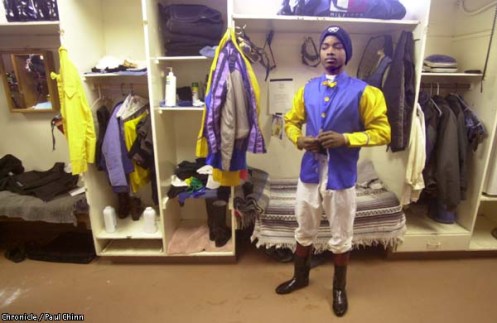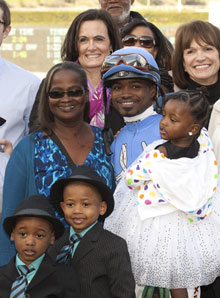Kentucky Derby Contender Kevin Krigger Could Make More African Americans Return to the Profession of Jockey
This is the first time that I have ever heard of the Virgin Islands-born jockey Kevin Krigger who will be riding Goldencents, the winner of last week’s$750,000 Santa Anita Derby, a qualifying race for the upcoming Kentucky Derby. It is not the first time that I have ever heard of black jockeys and neither will it be the last. Wikipedia does not yet give Kevin Krigger his own bio, but if he wins with Goldencents, they may have to put one up on the QT.

Kevin Krigger in his silks for Our Nautique before he won the 2011 San Francisco Mile at Golden Gate Fields (Courtesy: CaribVue)
Krigger, 29, made history as the first black jockey to win the Santa Anita Derby, and he has a chance to become the first black jockey in 111 years to win the Kentucky Derby since Jimmy Winkfield did it in 1902.
Krigger guided Goldencents over the 1â -mile race in 1 minute and 48.76 seconds, and paid $15, $5.40 and $3.40 at 6-1 odds. The 3-year-old bay colt is trained by Doug O’Neill and partly owned by Louisville basketball coach Rick Pitino, who is on a lucky streak. Pitino was named to the NCAA Hall of Fame, his team won the NCAA Championship and his horse has become a genuine prospect for horse racing‘s Triple Crown.
In the Santa Anita, Goldencents left no doubt about his qualifications, with the help of his jockey. Chasing pacesetter Super Ninety Nine for most of the race, Krigger took Goldencents to the lead by swinging him to the outside on the final turn with enough stamina left to easily overcome a charge from Flashback in the final stretch.
“It really made it look bad for Flashback when I kind of wasn’t really pushing that hard and was just coasting,” said Krigger. Flashback was the favorite in the race, and Krigger was quick to praise him. “That’s a horse that I expect to get better. Not too many horses can carry speed like he does.”
The Grade I Stakes Santa Anita Derby saw a much more patient Goldencents after O’Neill worked with him following last month’s San Felipe Derby, when Goldencents was baited into a suicidal pace by Flashback and finished fourth.
The difference in the outcome of the two races also demonstrated the talent that has brought Krigger to the top level of thoroughbred racing, but he was modest, about the victory.
“It was basically between me and the horse, being relaxed,” he said. “That was the key factor in the run.”
Last year, Krigger ranked 68th in earnings, according to Equibase, which tracks thoroughbred racing, and ranks 41st in wins. His career earnings are over $14 million dollars in the last decade.
In the U.S. Virgin Islands, horses are treated as pets and beloved farm animals, but Kevin Krigger wanted to ride. At the age of five, he sped away on a neighbor’s horse on a sneak. That wasn’t the last of his four-legged joy rides. By the time he was ten, he finally had his own horse and was challenging other boys to races. And even at that age, he had his eye on winning the great Kentucky Derby, or even the Triple Crown. When he reached his teens, however, it was a different story—making his dreams real.
His road to the Derby has been long, from his days as a teenager on St. Croix, walking two hours each way to the island’s only racetrack, to his early years in the U.S., where he arrived at 17, traveling to bottom-barrel tracks all over the country trying to attract a trainer or agent. He has worked to keep his weight down (at 5-foot-6, his ideal racing weight is 112 pounds) and fractured his spine in a nasty spill in December 2007. Yet he believed his time would come. “I always felt like a big-circuit rider,” he says. “Goldencents is the proof in the pudding.”
Before Goldencents, he was already “earning the respect of trainers and winning races at such small tracks as Thistledown in Ohio, Mountaineer Park in Chester West Virginia…” However, when he finally moved to California’s Golden Gate Fields, he really began to shine, but that did not mean that he was suddenly rich:
Jockey’s earn percentages of purses that range from 10 for first, five for second, and three for third and so on. They also earn a meager $67-70 for each horse they ride, but 25 percent of their earnings go to agent fees.
It is a brutal business to say the least, not discounting that every mount could be your last. Horse’s breakdown, jockey make mistakes, but in the glamour of the sport fans and consumed bettors are only concern with winning.
Krigger understands that. The (then) 28-year old has four children with his girlfriend Taisha, Kiki (11), Kunzai (5), Kevin Jr. (6) and Kynaira (2).
It should not be lost on you that all of his children initials are the same as his “KK” and their names are engraved onto the red leather saddle that rides on his many mounts.
He is not just happy to be along for the rides, but wants to become a dominant figure at the racetrack.
“I feel that I am the best jockey, but I am not always on the best horse,” he stated. In this business the best horses usually go to the jockey with the best reputation, talent or relationships.
It was Doug O’Neill, Goldencents’ trainer, who brought Krigger to Southern California and to Santa Anita. O’Neill trained last year’s Derby winner, I’ll Have Another. Thus, Goldencents became his first Grade I mount, which means that Krigger has finally arrived in the big leagues. He certainly has fans all over Northern and Southern California who follow racing and especially, winning horses. Take, for example, Anita Brenner, who backed Too Many Tomatoes one day with Krigger on board.
The race was on the inside turf, or grass. The course was one mile long. At first, Too Many Tomatoes hung back. She was the very last horse in the race. I grew pessimistic. My dream of cashing in on my bet seemed unattainable, until the last quarter mile. That’s when she began to make a run on the outside. The jockey seemed to know what he was doing.
Still, I felt pessimistic. She’ll never make it, I thought. Too little, too late. There goes my money.
I was wrong. Too Many Tomatoes not only caught up, she passed the entire pack.
The jockey looked fantastic.
As I waited in line to pick up my cash, I re-read the program. Time to reinvest the winnings. I noticed that the same jockey would ride in the next race, wearing a Superman shirt. Fashion is a sound basis for a wager, despite this horse’s questionable moniker.
I put $6 (“boxed”) for Bikini Bottom to place either first, second or third. As an afterthought, I put some money on a “rolling pick three.” I bet that the same jockey would win the next three races. How could he lose, dressed as Superman?
Within the hour, I became Kevin Krigger’s biggest fan. Kevin Krigger, the jockey, won all his races that day.
Who is Kevin Krigger? If you live in La Cañada Flintridge, a stone’s throw from Santa Anita, a with less than a month to go until the Kentucky Derby, and still don’t know the answer, then shame on you. Kevin Krigger came to the U.S. from the Virgin Islands in 2001, at the age of 18, with the goal of winning the Kentucky Derby.
I can expect no less from Krigger on May 4, breaking all odds.
Related articles
- Santa Anita Derby winner Goldencents is Kentucky Derby bound (utsandiego.com)
- Pitino’s Derby-bound Goldencents Wills Cardinals to Title Game (horsesandhoops.com)
- Goldencents wins Santa Anita Derby (m.si.com)
- Kevin Krigger Wins Santa Anita Derby With Rick Pitino’s Goldencents (losangeles.cbslocal.com)
- Rick Pitino’s Horse Goldencents Wins Santa Anita Derby (bleacherreport.com)
- Goldencents punches Derby ticket at Santa Anita (nbcsports.msnbc.com)













Thought you’d enjoy this piece I wrote last year.
http://africasacountry.com/2012/10/16/africa-is-a-jockey/
LikeLike